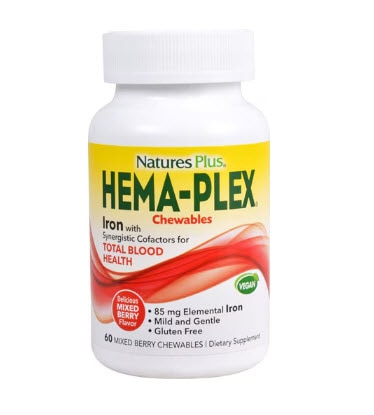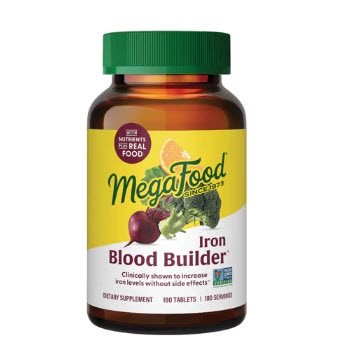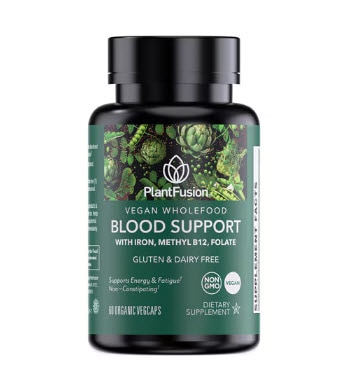Americans are in love with supplements. In fact, more than 57% of us take supplements in a given 30-day period, according to the Centers for Disease Control and Prevention.
Most people take supplements to boost their health. However, it’s possible that some supplements might also act as blood thinners.

For many people, this should not cause alarm. If you are healthy, a blood-thinning supplement is unlikely to put you in danger and might even be helpful.†
However, those who take blood-thinning drugs such as warfarin or how have specific health profiles should be careful about the supplements they take.
“Supplements with blood-thinning properties can offer certain health benefits, but they’re not without risks, especially for people already on medications or with underlying health conditions,” says Dr. Pamela Tambini, an internist and physician and medical director at Engage Wellness.
Supplements that might have blood-thinning properties
Research has found that a number of supplements can act as blood thinners. According to WebMD, these include:
- Aloe
- Chamomile
- Cranberry
- Dong quai
- Evening primrose oil
- Fenugreek
- Feverfew
- Fish oil
- Garlic
- Ginger
- Ginkgo
- Ginseng
- Meadowsweet
- Red clover
- Turmeric
- White willow
Certain ingredients might indicate that a supplement is more likely to have blood-thinning properties. Tambini says these ingredients include:
- Omega-3 fatty acids
- Vitamin E
- Garlic
- Ginger
- Turmeric
- Ginkgo biloba
Interestingly, some foods and spices also have been linked to having anticoagulant properties. They include cayenne, cinnamon, garlic, ginger, pepper and pineapple.
Can supplements help you to avoid blood clots?
Some people take specific types of supplements as extra insurance against forming blood clots. However, while these products might offer some benefits for those at low risk of blood clots, they are no substitute for doctor-prescribed medicines.†
Those at high risk of developing clots should not conclude that a supplement is what they need to stay safe.
Even worse is the belief that taking a supplement is an effective treatment for dissolving already-existing blood clots. This is not true. Existing clots always require prompt medical attention.
The potential danger of blood-thinning supplements
Doctors prescribe blood thinners — formally known as anticoagulants — as a way to protect patients at high risk of developing blood clots. Such medications can lower the risk of stroke.
Prescription blood thinners might be used to reduce the chance of deep vein thrombosis, a blood clot that often develops in the legs.
They also are prescribed to prevent a pulmonary embolism, which occurs when a blood clot travels via the arteries and into the lungs.
Some people have a higher risk of forming blood clots, including those who:
- Have been diagnosed with specific illnesses, such as heart disease, lung disease, cancer or inflammatory bowel disease
- Have had an injury to a vein
- Are pregnant
- Sit for long periods or are confined to bed
- Are paralyzed
- Have increased estrogen related to taking some types of contraceptives or hormone-replacement therapy
Blood thinners can be helpful for such people. However, getting too much of a blood thinner can be a bad thing, as it can cause severe bleeding. That is why combining a blood-thinning drug with a blood-thinning supplement can be dangerous.
“Even over-the-counter medications like ibuprofen and aspirin can thin the blood,” Tambini says. “Be cautious about combining these with supplements.”
Tambini says those who should be especially alert to the risk of taking blood-thinning supplements include:
- Anyone on blood-thinning drugs
- Those with bleeding disorders such as hemophilia
- Older adults, who are more likely to be on medications that can interact with supplements
- Surgical patients, as blood-thinning supplements might increase the risk of bleeding during or after surgery
“If you fall into these categories, talking to your doctor before taking blood-thinning supplements is essential,” she says.
Signs that your supplements might be causing trouble
Tambini says those taking blood-thinning supplements should look for early signs of excessive thinning of the blood, such as:
- Easy bruising
- Cuts and scrapes that bleed for a longer period
- Frequent nosebleeds
“If you notice these symptoms, stop taking the supplement immediately and contact your health care provider,” she says.
Women who have a heavier-than-normal menstrual cycle while taking supplements also should be on guard.
Internal bleeding is perhaps the biggest risk of taking blood-thinning supplements. This is a serious issue that demands immediate medical attention.
Without treatment, internal bleeding can lead to seizures and even organ failure. In a worst-case scenario, it can result in coma or death.
Serious symptoms that might indicate internal bleeding include urine that turns red or brown, or feces that look red or like tar.
A severe headache or stomachache are other signs of internal bleeding, as are dizziness and weakness that might indicate anemia. Brown or red vomit also may accompany internal bleeding.
“For severe symptoms like significant bleeding or fainting, seek emergency medical attention right away,” Tambini says.
The bottom line on blood-thinning supplements
For many people, taking supplements with blood-thinning properties is unlikely to pose a health danger.
Tambini says those taking such supplements should stick to the recommended dosage and not combine multiple blood-thinning supplements unless directed to do so by a doctor.
However, other folks should be careful about taking any supplements with blood-thinning qualities.
This is especially true of those who already take prescription anticoagulants.
“If you’re on prescription blood thinners and supplements, your doctor may recommend periodic blood tests to ensure your clotting levels remain safe,” Tambini says.
It is also important to note that the federal government does not monitor herbs and supplements as vigorously as it does medications. That makes it difficult to know the precise level of blood-thinning qualities in any given supplement.
In addition, supplements should never be viewed as a primary means of preventing or treating blood clots. Those who are at increased risk for blood clots should always consult a physician about their condition.
“The key to using these supplements safely is understanding their effects, monitoring for side effects, and working closely with your health care provider,” Tambini says.
†These statements have not been approved by the Food and Drug Administration. These products are not intended to diagnose, treat, cure or prevent disease.
Featured Products



The post Your Supplements Could be Thinning Your Blood – Here’s Why it Matters first appeared on The Upside by Vitacost.com.

